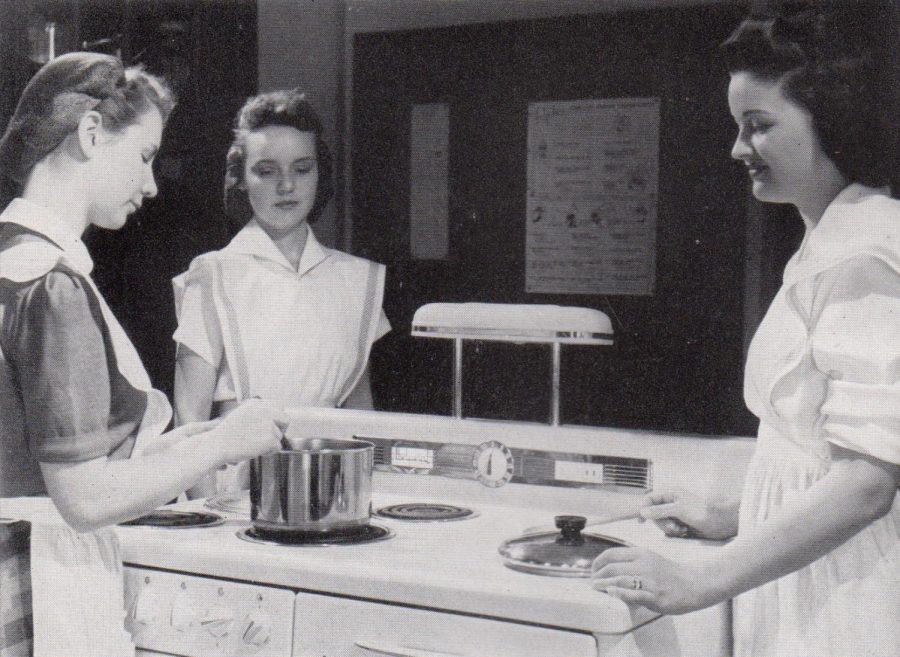Elimination of Home Economics leaves students ill-prepared for life
Shimer College/ Wikimedia Commons
Students in a college home economics class in 1942 at Shimer College, a now-closed institution. Grady no longer offers courses in home economics.
March 31, 2021
Reading, writing and arithmetic prepare students to graduate, but Home Economics classes prepare students for life.
While Home Economics was a popular class available throughout the 1900’s that taught students essential life skills, such as cooking, cleaning, household management and finance, it now rarely shows up in classroom curriculums.
Home Economics classes were taken out of Grady over 20 years ago to make room for more technology-oriented classes, like engineering.
Former Home Economics teacher LaReese McNew began teaching at Grady in 1983. The absence of home economics classes from Grady’s current course list surprised McNew.
“I think that Home Ec. should be a part of the curriculum,” McNew said. “There are a lot of students at Grady who would benefit from the material. There are things taught years ago that kids could use and even make money at, if they then go out and get a little more training. All of that was done away with by taking away home economics. The skills taught in Home Ec. are never not going to be used.”
When Grady offered a Home Ec. curriculum, the classes were electives and optional and because these classes were also less popular, it was harder to get students to enroll in them.
“Interest was my biggest struggle as a Home Economics teacher,” McNew said. “Kids had to be steered in the direction of taking the classes. Classes like textiles and food science were easy to sell to students but unpopular ones like finance were difficult.”
Perception of the class plays a big part in why many schools do not offer it. Some believe that only girls benefit from Home Ec., and it was their duty to take the class. However, when McNew taught the course, this was not the case.
“The curriculum was not designed to only benefit girls,” McNew said. “The skills taught were universal. I taught the class from the aspect of teaching students, male and female, how to get along on their own, how to cook their own meals and how to budget. The class was not benefiting one gender more than the other.”
While some still hold the belief that the Home Ec. curriculum is rooted in sexist beliefs, others disagree. Sophomore Gabby Berger explains that the class could benefit both boys and girls if they were required to take it.
“In my opinion, I don’t think that Home Ec. classes are sexist at all,” said Berger. “I can see how people could view it in that way because there is this narrative that women have to cook and clean and that class teaches them that, but those are life skills that should be taught to every student, regardless of gender identity. I don’t think that this class promotes being a housewife at all.”
A benefit of Home Ec. was it didn’t confine students to the classroom. McNew brought students into the real-world.
“We did a lesson on how to buy groceries, and when I went to the grocery store for my food classes, I always tried to bring along some of my students to teach them what real life is like,” McNew said. “Then, I noticed small holes in the walls around the school, so the kids in my classes and I would walk around to spackle them up. I also had a plumber come in and teach us how to change a washer on a sink.”
McNew emphasizes that if Home Ec. is not taught, young adults end up going into the world without basic skills. While some students’ parents might teach them the necessary skills at home, others will graduate without any knowledge of those skills.
Kayln Levens, who graduated from Grady in 2015, said taking a Home Ec. class would have helped her in college.
“In college, you’re basically thrown off the deep end into real life,” Levens said. “Although you might pick up on small things that your parents did, no one really teaches you how to be a functioning adult. It’s knowing little things that would have helped me, like which laundry detergent to use or how to sew on a missing button. If I were to have taken Home Ec. classes at Grady before I graduated, it would’ve helped me tremendously with learning life skills, and it would’ve made the adjustment to college a lot easier.”
Some students, such as freshman Ryan Carter, aren’t opposed to the idea of Home Ec. coming back. Carter believes that she and others would learn valuable information.
“The class would help kids know how to cook, which is a really important life skill,” Carter said. “It would also help kids know basic things to help around the house like how to clean, for example.”
Sophomore Keegan Kronenberger agrees.
“I feel like I would benefit from home economics because of all the skills it teaches,” Kronenberger said. “Leaving high school is going to be hard to get used to, and if I were able to take this class, it could help me adjust. Not just this, but Home Economics could give me a break from the regular curriculum and give us something new to learn.”
McNew emphasizes the Home Ec. prepares students for life.
“I was teaching the students how to survive on their own,” McNew said. “Even the little sections like sewing buttons on coats for kids that were going to college that really weren’t interested in learning to sew but needed to know little things like that in order to live on their own really made a difference.”









Viola • Mar 8, 2022 at 4:26 pm
Hi Katie and thanks for the article about Home and Economics and how it necessary for All genders to possess these life skills!
I am in the process of introducing this idea to a few of the local school boards in my area!
Keep up the great journalism!
Thanks,
Viola
Craig Houser • Jan 16, 2022 at 10:22 pm
I am a family and consumer sciences teacher. Home Ec or what ever they call it now days a given school is something that should be placed into the past and move on. Parents should be the ones to teach this if they decide too or not. Maybe I am jaded but what are the parents teaching their child anyways? But I also have steered students from going into teaching. They push the kids into these fields saying how great the pay is but there I more to teaching than the money . How abut a true deep concern and commitment about educating the youth of tomorrow, Instead most parents do not show up for parent conferences, care very little about their students progress and blame us when their child has created the problem instead of trying to work towards solutions.
Jastus ndunda • Oct 25, 2021 at 3:49 pm
Home economics gives the basic skills for survival, think of the food we take, the clothes we wear, the houses we live in, the way we relate with one another, among many other aspects of life, all this have a touch of home economics, home economics shapes us, makes adapting to changing situations easy and its a career subject too. I have taught home economics for 4 years now and I can see the fruits in my learners
Robert Smith • Sep 15, 2021 at 11:17 pm
My mom would always tell me things she learned in home economics from the late 1940s at the University of Kansas. Like food with eggs in them go bad the fastest at room temperature. Mayonnaise for example.
Mattie Johnson • Jul 2, 2021 at 4:31 pm
Home Economics was an ESSENTIAL life class. The basics of taking care of yourself – cooking, proper food choices, balanced nutritional meals, food preparation. To me very similar to Industrial Arts which taught how to use a saw, how to measure, follow instructions to repair, build, maintain. Now our kids are no longer prepared for so many basics. Those classes helped them to be more self reliant. I hope they will be reinstated in schools.
A'isha • Apr 3, 2021 at 6:00 am
Home Economics programme is very necessary in very high school. In the school where i teach, this academic year alone we enrolled about 200 students, but majority of them are girls. The boys are just about 0.001 %. Most of our students from high school further their line of education to the nurses training and teachers training schools. Others continue with the same home economics course to the universities. I will say the home economics programme a necessary course that each and every adolescent must take a bit of it. In our curriculum apart from sewing and cooking, we have a subject title Management in living where we teach topics like parenting and parenthood, conflict resolution, effective communication, drug abuse etc etc. We also have an association where we meet us home economics teachers to deliberate on issues that bothers the home economics course in various schools.